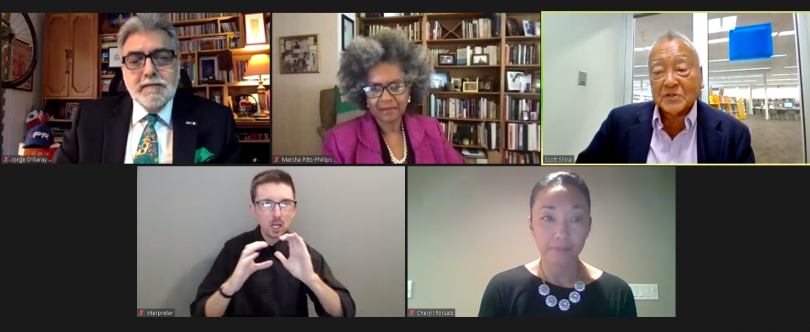Particularly after a year of deep divisions in society, “Understanding different groups and cultures benefits us all,” Cheryll Ocampo Forsatz said. Building coalitions “means creating understanding and relationships” with “other groups who are facing the same concerns and issues we are.”
Ocampo Forsatz, vice president of corporate communications and public relations in the Parsippany, N.J. office of Ferrero USA, a global confectionary company, was a panelist on PRSA’s May 19 Diverse Dialogues titled “Beyond the Hashtags: How PR/Comms Pros Can Drive Unity.” The event was held during Asian American and Pacific Islander Heritage Month.
Amid a rash of physical assaults against Asian people in cities such as New York and San Francisco, the more that Asian Americans “can reach out to other groups — Black Americans, Hispanic Americans — and align with them, understand their experiences and share our own experiences with them, the more we can all work together toward a common goal” of unity, Ocampo Forsatz said.
“A lot of the different minority groups — Black, Hispanic, Asian — have been trying to take the bull by the horns and do everything themselves, rather than collaborate” to create unity, said Scott Shirai, APR, Fellow PRSA, who moderated the webinar. Shirai is chair and president of Visual Perspectives, a communications consultancy in Brook Park, Ohio, near Cleveland.
A year ago, George Floyd’s death in Minneapolis police custody “caused an awakening,” said panelist Marsha Pitts-Phillips, APR, president and founder of MRPP & Associates Communications, a PR firm in the Minneapolis–Saint Paul area. A melting pot of people took to the streets to raise their voices. “We had white allies, those from the Asian American community and the Latino community, who all came together in an uproar and outrage,” said Pitts-Phillips, diversity & inclusion officer for the Minnesota PRSA Chapter.
After Floyd’s death, the Chapter established an advisory group composed of “professionals who aren’t necessarily communicators, but who work in diversity, equity and inclusion” and have different ethnic makeups, she said. “We tap into their expertise and experience” when exploring the Chapter’s programming, professional development and messaging, Pitts-Phillips said.
Communicators as ‘the conscience’ of organizations
As communicators, “we sit in a very influential seat within our organizations,” Ocampo Forsatz said. “We serve as the conscience [and as] advocates for doing the right thing.” And since communicators respond to company missteps, we should “be mindful and careful with the messaging and actions we take.”
PR and communications professionals must “have the courage to speak up,” Pitts-Phillips said. “We have to be the ones who push back and provide that additional counsel and guidance. When an organization, wholeheartedly, is attempting to communicate about diversity, equity and inclusion initiatives, we have to be very careful of the framing, the context and the approach of the messaging — because that’s where we see the train go off the rails so often.”
More alike than different
To unite rather than divide, “We need to not be selfish; we need to collaborate with each other,” said panelist Jorge D’Garay-Pallares, president and CEO of MXUS Public Relations, a firm with offices in Tijuana, Mexico, and San Diego.
He lives on the border of Mexico and the United States, where “going to another neighborhood means going to another country,” said D’Garay-Pallares, a member of the PRSA Board of Directors. “We have different cultures and different languages, but we have the same challenges — crime, climate change, immigration.”
When trying to understand other people’s points of view, “We need to be humble and listen to everybody and then work together,” he said. “And then you have a strong message. If not, you have different messages from different sides and the coalition doesn’t work.”
And while messages might need to be tailored to different groups, creating unity means demonstrating “that we are more the same than different,” Ocampo Forsatz said. Or as PRSA member Olga Mayoral Wilson, APR, Fellow PRSA, wrote in the comments section of the webinar, among all groups, “Commonalities are many more than differences.”







